Sing:
Hark the Vesper bell is pealing
O’er the meadow soft and green.
Nearer now and nearer stealing
Soft it breaks upon my ear.
Jubilate, jubilate, jubilate, Amen. Jubilate, jubilate, jubilate, Amen.
Some opening words: from The Emancipation Proclamation, September 22, 1862.
“On the first day of January, in the year of our Lord one thousand eight hundred and sixty-three, all persons held as slaves within any State or designated part of a State, the people where of shall then be in rebellion against the United States, shall be then, thenceforward, and forever free; and the Executive Government of the United States, including the military and naval authority thereof, will recognize and maintain the freedom of such persons, and will do no act or acts to repress such persons, or any of them, in any efforts they may make for their actual freedom.” -Abraham Lincoln, President
Sing: “Up Above My Head”, an African-American spiritual and favorite camp song.
Up above my head (up above my head), I hear clapping in the air (I hear clapping in the air).
Up above my head (up above my head), I hear clapping in the air (I hear clapping in the air).
And I really do believe (and I really do believe), there’s a heaven up there.
(There’s a heaven up there).
Up above my head……I hear clapping in the air……
Up above my head….I hear whispering in the air….
Loudly: Up above my head…..I hear clapping in the air….
Slowly: And I really do believe (and I really do believe), there’s a heaven up there.
(There’s a heaven up there).
More Opening Words: Lately it is difficult to find a week that is boring, don’t you think? This past week included more opportunities for each of us to align with the Black Lives Matter movement. The week also included a holiday, Juneteenth, that many of us may not have even known about. Juneteenth. On June 19th 1865, two and a half years after Abraham Lincoln proclaimed the Emancipation Proclamation, General Gordon Granger brought the news to slaves in Texas. Texas was the most distant US state at the time and communication being what it was then, news traveled slowly. But it did arrive, and one year later, the first Juneteenth celebrations happened in the larger towns in Texas. Now the holiday is recognized and celebrated in all but two of our states, Hawaii and South Dakota. There’s a move in the US government to declare Juneteenth a national holiday. Certainly in these important days of national (and international) attention to Black Lives Matter, this possibility should be seriously considered by our legislators.
Camp Betsey Cox fully supports the values and agenda within the Black Lives Matter movement. This Vespers will call us all together in naming our community’s commitment to social justice and equity and to deeply affirm that Black Lives Matter.
Sing: “Swing Low Sweet Chariot”, 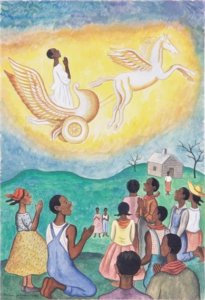 another African-American spiritual the singing of which was part of most Juneteenth celebrations over time. We have a beautiful version of it that we have sung many times at camp. We shall bring it back up when we are together again!
another African-American spiritual the singing of which was part of most Juneteenth celebrations over time. We have a beautiful version of it that we have sung many times at camp. We shall bring it back up when we are together again!
Chorus: Swing low, sweet chariot, comin’ for to carry me home.
Swing low, sweet chariot, comin’ for to carry me home.
I looked over Jordan and what did I see,
Comin’ for to carry me home.
A band of angels, comin’ after me,
Comin’ for to carry me home.
Chorus
I’m sometimes up and sometimes down.
Comin’ for to carry me home.
But still I know I’m heavenly bound
Comin’ for to carry me home.
Chorus
If you get there before I do,
Comin’ for to carry me home.
Tell all my friends that I’m comin’, too.
Comin’ for to carry me home.
Chorus
If I get there before you do,
Comin’ for to carry me home.
I’ll cut a hole and I will pull you thru,
Comin’ for to carry me home.
Chorus
Words to Consider:
“Let my people go”.—-Nineteenth century spiritual
“I have borne thirteen children and seen most all sold off to slavery.” —-Sojourner Truth
“When I found I had crossed that line…..there was such glory over everything.”—Harriet Tubman
“There is a better day coming.” —Frederick Douglas
“Facing the rising sun of our new day begun, let us march on till victory is won.”
—James W. Johnson
“We who believe in freedom cannot rest.”—Ella Baker
“For I am my mother’s daughter, and the drums of Africa still beat in my heart.”
—Mary McLeod Bethune
“No bomb can kill the dreams I hold, for freedom never dies.”—Langston Hughes
“An important part of being a firm ally for the Black Lives Matter movement is education yourself about the lived experiences of Black people.” —Roxanne Ody
“No matter how big a nation is, it is no stronger than its weakest people, and as long as you keep a person down, some part of you has to be down there to hold him down, so it means you cannot soar as you might otherwise.” —Marian Anderson
“We treat racism in this country like it’s a style that America went through. Like flared legs and lava lamps. ‘Oh, that crazy thing we did.’ We treat it like a fad instead of a disease…you’ve got to get at it at a lab, and study it, and see its origins, and see what it’s immune to and what breaks it down.” —Chris Rock
Sing: “When the Saints go Marching in”, An African-American spiritual 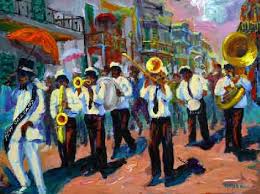
O when the Saints go marching in,
O when the Saints go marching in,
O Lord I want to be in that number,
When the Saints go marching in.
And when the sun begins to shine,
O when the sun begins to shine
On that hallelujah day…
O when the trumpet sounds the call.
O when the Saints go marching in,
O when the Saints go marching in,
O Lord I want to be in that number,
When the Saints go marching in.
Story: “Show Way”, by Jacqueline Woodson, illustrated by Hudson Talbott
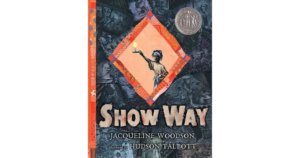
Almost 20 years ago now, Jaqueline Woodson wrote the words to this story that Hudson Talbott then illustrated. The story traces the history of an African-American family, divided by slavery, but held together by invincible strength and courage. Borrow this book from your town library! It has been part of Betsey Cox Vespers time and time and again and it is always perfect for the moment. Here are the words. You can imagine the images.
When Soonie’s great-grandma was seven, she was sold from the Virginia land to a plantation in south Carolina without her ma or pa but with some muslin (fabric) her ma had given her. And two needles she got from the big house—and thread dyed bright red with berries fro the chokecherry tree.
In South Carolina, Big Mama raised Soonie’s great-grandma. Raised most of the slave children on that large patch of land.
At night, Big Mama told the children stories. Stories she’d tell in a whisper about children growing up and getting themselves free. And the children leaned in. And listened real hard.
And in the daytime when there was some few minutes for a slave to rest a bit, Big Mama taught Soonie’s great-grandma to sew colored thread into stars and moons and roads that slave children grew up and followed late in the night a piece of quilt and the true moon leading them.
Years passed. Big Mama moved on to the next world.
And Soonie’s great-grandma grew up, jumped broom with a young man named Ensler. Had herself a baby girl and named that child Mathis May. Loved that baby up so. Yes, she loved that baby up. And one day Mathis May would be Soonie’s grandma, but not for a long, long time yet. In the meantime, she learned to sew. Beautiful girl child learned to sew.
When Mathis May was seven, she got sold away. Took a star from her mama’s blanket, took a little piece of the road. Pressed it to her face when she wanted to remember back home. Held it to her heart to feel back home. Got herself a piece of muslin and some thread somewhere and kept up her sewing. Sewed so fine, she was making clothes for everyone in the big house and slaves too.
And at night, she sewed stars and moons and roads—tiny patch pieces of stars and moons and roads. Slaves whispered what no one was allowed to say: That Mathis knew how to make….
A SHOW WAY. Came to her when they needed to talk; came to her for the stories of brave people; came to her for the patch pieces just before they disappeared into the night.
But Mathis May stayed on, grew tall and straight-boned, jumped broom with another slave.
That slave was killed running off to the north side of the war months before he got to meet his baby, a girl-child who was born free that same year, 1863, History went and lost her name…..
Years later—Soonie came. Soonie’s mama held her up in the moonlit night. Showed her the stars, the moon, whispered into her ear, There’s a road, girl. There’s a road. Loved that Soonie up so. Yes, she loved that Soonie up.
Soonie and her mama stayed on the land they’d always known, picking cotton for a little pay and a piece of that ground to farm. Called that land HOME. Stayed on with other people—none of them slaves anymore. Hard work making a life—from pink day to blue-black night—but it was a free life just the same. And when the day was finally over, wasn’t hard to find a thing or two to smile about. At night, they cut and sewed. Strange lines and odd designs. People said about Soonie, ‘That child could find some beauty in so many things.’
When Soonie was seven, she was tall and straight-boned like her mama, took in wash with her mama. Sewed stars on patch pieces. Sewed stars and moons and roads; sewed fields and rivers and trees. Patched the pieces together for her mama to sell come market day. Called those quilts Trail to the North. Called the Quilts Show Way. Didn’t much need that secret trail to the North anymore but started living well off the money those quilts brought in. Sewed those quilts to live. Sewed those quilts to remember.
And though some could book read, most could not. Stars and moon and roads. Picture reading was what they’d always known. Some mornings, Soonie looked out over the fields of cotton and dreamed of a place to call her own. Married a man named Walter Scott, who owned a bit of land in Anderson, South Carolina. Had herself a baby girl, named that girl-child Georgiana. Loved that baby up so, Yes, they loved that baby up.
Georgiana, who grew tall and straight-boned and free, picking out words from her mama’s Bible by three. Reading by oil-lamp light at age five. People say about Georgiana, ‘She always had a book in her hand.’ Grew up to teach at a small school in Anderson. Had herself two girls at once, named them Caroline and Ann. Loved those babies up so. Yes, they loved those babies up.
And Caroline and Ann grew up tall and straight-boned. Turned Seven walking in a line to change the laws that kept black people and white people living separate.
They were a little bit scared sometimes, but pinned inside their dresses were Show Way patches Grandma Soonie had given them. And something about those patches made ‘Scared’ hang his mean old head and walk away.
Ann grew up writing poems. And sometimes she made the poems into songs. Caroline stitched those songs into art that people bought to hang up on their walls.
Ann had me. And Mama loved this baby up so. Yes, she loved this baby up.
And when I was seven, I didn’t have to work in a field or walk in any Freedom lines. But I still read like Georgiana and wrote like Ann, and when the words were slow in coming, I sewed stars and moons and roads into quilts and curtains and clothes because Mama said, ‘All the stuff that happened before you were born is your own kind of Show Way. There’s a road, girl’, my mama said. ‘There’s a road, girl’.
And I grew up, tall and straight-boned, writing every day. And the words became books that told the stories of many people’s Show Ways.
Had a baby and named that child Toshi Georgiana. Loved that Toshi up so. Yes I loved that Toshi up. So some mornings, I start all over. Holding tight to little Toshi, I whisper a story that came before her….
‘Now, Soonie was your great-great-grandma. And when Soonie’s great-grandma was seven……”
Sing: “We Shall Overcome”, a protest song.
We shall overcome, we shall overcome, we shall overcome some day.
Oh, deep in my heart, I do believe, that we shall overcome some day.
We’ll walk hand in hand, we’ll walk hand in hand, we’ll walk hand in hand, some day.
Oh, deep in my heart, I do believe, that we’ll walk hand in hand someday.
We’ll not be afraid, we’ll not be afraid, we’ll not be afraid someday.
Oh, deep in my heart, I do believe that we’ll not be afraid someday.
We will work for change, we will work for change, we will work for change someday.
Oh, deep in my heart, I do believe, that we will work for change someday.
A Few More Words: There’s a toy out there that is interesting to consider in these days. You have one in a toy drawer somewhere, or you did before fidget spinners became the toy of the day. It’s a slinky. You know what it looks like. When you pull it out of its box, it’s a tight stack of plastic rings, one stacked up on the next. The whole thing may be three or four inches tall. It’s fun to play with. It can stretch up, can be tossed between two people in interesting ways, and it can even go downstairs with very little instruction involved! 
You may be surprised to know that it can help us all think about change in our country, right now, change relating to the Black Lives Matter movement. Jacqueline Woodson’s SHOW WAY book tells a story of a family’s circles, one person deeply attached to the next, to the next and to the next, all stacked up in the latest person in the family. Each of our families, as you consider your own, is like a slinky of people, each person different, each person building on the history of the persons before them.
The story of African-Americans in our country can be understood in the same way. Around and around the circles of African-American change travel, from the highly painful roots for the first Africans to arrive, enslaved, on our shores, to the painful situations still embedded in African-American lives. Change does take place, just like in the slinky, one ring of change building on the work of people of good will after the next after the next.
Upon occasion, remember, a slinky can go down the stairs, spreading itself out in a large leap! Think about the history of African-Americans in the American story. In 1863, President Abraham Lincoln pushed the American slinky down the stairs with his Emancipation Proclamation! Slaves were freed! BIG change coming! As we know, of course, the slinky did compress again—the rings were a little higher, but the entire story still remained largely the same.
There are other moments of big change in our country’s struggle with race, of course. Think about the amendments to the Constitution that assured African-Americans the right to vote. Or the Supreme Court Case (Brown vs. Board of Education) that guaranteed equal education to African-American citizens. You can pour over the stories of the Civil Rights movement in the 1960s and 70s. There are some slinky-leaps in those stories.
And yet…the slinky, though it does build, ring after ring, still collapses on itself, a metaphor for slow progress on these important issues.
You can apply the slinky metaphor to most social justice issues in our country. Think about the Women’s movement. Yes…there are large leaps of change, a settling, and a need for work to assure more large leaps of growth and change. You can think of other examples of issues that reflect the same process.
Of course the slinky is a toy and this is life! We can learn from the slinky, but must remember that each person in every generation, in order to keep the rings going around and going upward, needs to continue to contribute to the work of change.
Betsey Cox people across our country and the world are looking for ways to work now….for the Black Lives Matter movement and, we can be sure, for change in other important world issues. Make sure to hold your stories, so that when we are all together again, we can inspire each other with them!
Sing: “If I had a hammer”, a protest song 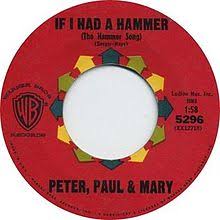
If I had a hammer, I’d hammer in the morning.
I’d hammer in the evening, all over this land.
I’d hammer out danger, I’d hammer out warning.
I’d hammer out the love between my brother and my sister.
All over this land.
If I had a bell, I’d ring it in the morning.
I’d ring it in the evening, all over this land.
I’d ring out danger, I’d ring out warning.
I’d ring out the love between my brothers and my sisters,
All over this land.
If I had a song, I’d sing it in the morning.
I’d sing it in the evening, all over this land.
I’d sing out danger. I’d sing out warning.
I’d sing out the love between my brothers and my sisters.
All over this land.
Well I’ve got a hammer, and I’ve got a bell.
And I’ve got a song to sing, all over this land.
It’s a hammer of justice, it’s a bell of freedom,
It’s a song about the love between my brothers and my sisters.
All over this land
A Bit of Fun: If you research Juneteenth, you will find that celebrations came to include a lot of special foods and treats as the celebrations soon became fairs. One of the most popular treats that appeared at Juneteenth Fairs was Strawberry Soda. So you make a strawberry sweet syrup, pour it into your lemonade, tea, or soda, add a lot of ice for a hot day, and….YUM!! 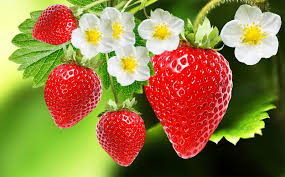 This week at camp, if we were there, we would be off into Vermont strawberry fields, would pick a bunch to dip in chocolate, would make some jam at the Farmhouse with Nana’s recipe, and now…we could make this refreshing drink! Here’s the recipe:
This week at camp, if we were there, we would be off into Vermont strawberry fields, would pick a bunch to dip in chocolate, would make some jam at the Farmhouse with Nana’s recipe, and now…we could make this refreshing drink! Here’s the recipe:
Strawberry Soda
Take 2 pounds of very ripe strawberries and cut them into chunks.
Put the strawberries in a pot along with 3 cups of cold water.
Bring the strawberries and water to a boil, then simmer for about 15 minutes until the strawberries are very soft.
Strain the strawberry juice through a mesh strainer, throwing out all that good-looking pulp!
(Or put it in a bowl with some good whipped cream!)
Stir 2 cups of white sugar into the strained strawberry juice. Stir until the sugar is dissolved. Then bring the strawberry juice back to a boil a second time. Reduce the heat to medium and simmer for 5 minutes.
Scoop off any foam that has developed, and cool the juice to room temperature.
Put the juice into a lidded jar, refrigerate and pull it out to put in your drinks! OH SO GOOD!!
Sing: “Peace I ask of thee oh mountains”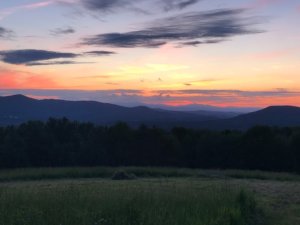
Peace I ask of thee, oh mountains.
Peace, peace, peace.
When I learn to live serenely,
Cares will cease.
From the hills I gather courage.
Visions of the days to be.
Strength to lead and faith to follow,
All are given onto me.
Peace I ask of thee, oh mountains.
Peace, peace, peace.
Final Words:
“Race and racism is a reality that so many of us grow up learning to just deal with. But if we ever hope to move past it, it can’t just be on people of color to deal with it. It’s up to all of us—Black, white, everyone—no matter how well-meaning we think we might be, to do the honest, uncomfortable work of rooting it out. It starts with self-examination and listening to hose whose lives are different from our own. It ends with justice, compassion, and empathy that manifests in our lives and on our streets.”
-Michelle Obama
Silence
Jubilate, jubilate, jubilate, Amen. Jubilate, jubilate, jubilate, Amen.


